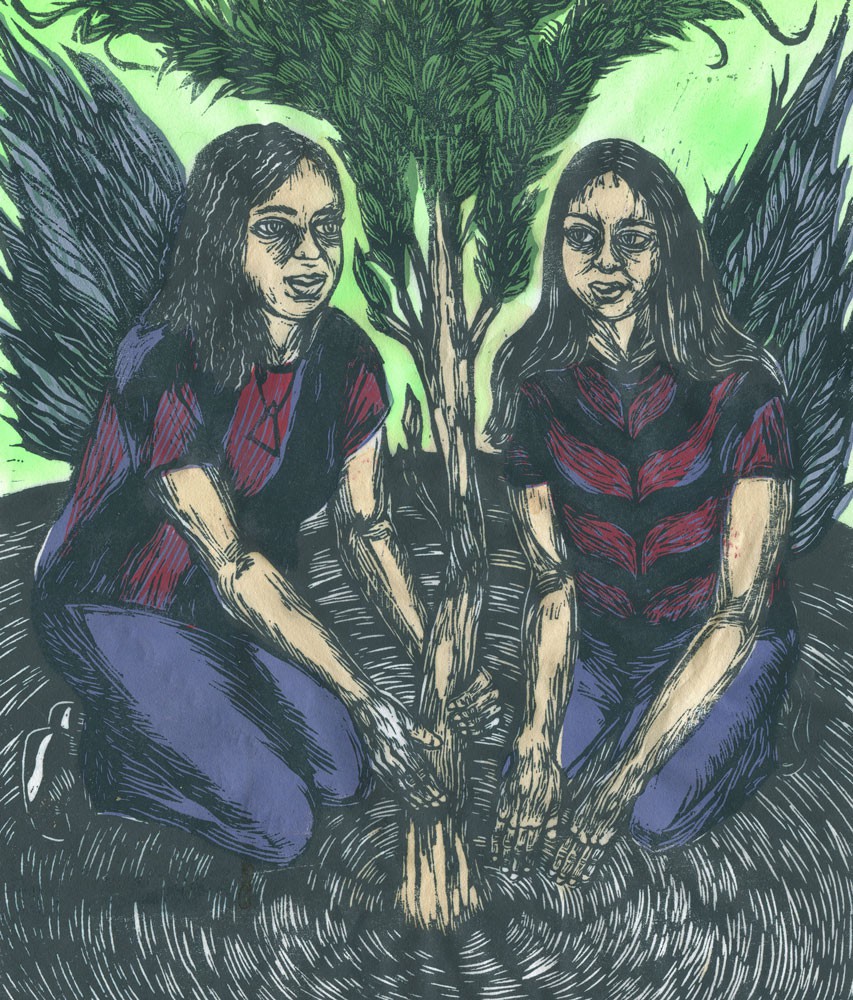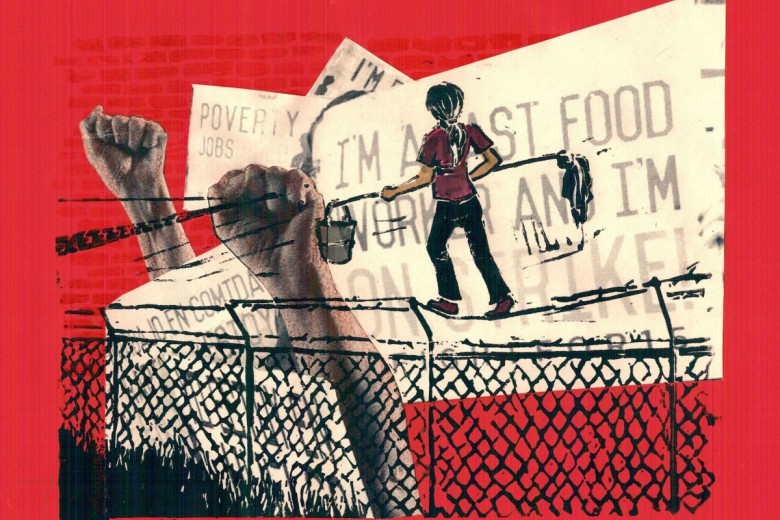
Feminism isn’t dead. In fact, recent news tends to present feminism as Lady Lazarus, being “reborn” in the dazzling invocations of Beyoncé, the impassioned addresses of actor Emma Watson, and the executive leanings-in of Sheryl Sandberg. Beyond the advocacy of celebrity culture, Pakistani activist Malala Yousafzai and the mass abduction of the Chibok schoolgirls in Nigeria have raised the issue of girls’ equal access to education. At home, outrage mounts over the Conservative government’s refusal to address the systemic issue of hundreds of missing and murdered Indigenous women and girls, as well as its stubbornly sexist resistance to implementing a desperately needed national child-care program.
Despite these issues and so many more, non-elite feminist voices are often trivialized or ignored. Last year, for example, Toronto Star columnist Heather Mallick asked, “Where are Canada’s prominent young feminists, if it has any active, prominent feminists at all?” In a response piece, I wrote: “Heather, we’re everywhere. Feminists might not be jutting out of the national landscape like those gloriously phallic Lawren Harris icebergs. We’re more like stars in the northern skies: if you don’t see us, you might not be looking long or hard enough, or maybe there’s something else getting in the way.”
What was getting in the way? How on earth could Mallick possibly miss the young feminists in the Miss G Project for Equity in Education, Hollaback!, and SlutWalk? What about Idle No More, the Maple Spring, Occupy, and other mass uprisings chock full of strong activists concerned with gender and equality issues? Just how prominent and famous do you have to be to be a feminist, anyway? And exactly what sorts of feminism are you supposed to be active in to get some respect?
Looking back on the waves
How we talk about social movements matters. Mallick’s obliviousness to the existence of young feminists today raises the question of the power of metaphors to frame our struggles. The idea that there have been at least three waves of feminism in the Global North has been highly influential, but can we still speak of waves of feminism now? What does it mean to think of ourselves as feminists in waves? Who does that leave out?
The First Wave – roughly spanning the 19th century to the first quarter of the 20th – focused on civil and political rights: legal personhood and the rights to inherit and hold property, vote, run for office, and access higher education. These rights were at first enjoyed only by white, middle- or upper-class women, but were gradually won – on paper, at least – by all. The Second Wave reached its zenith in the 1970s. Women organized to raise consciousness of their unequal conditions, and named and challenged patriarchy and structures of everyday oppression (the family, the workplace, electoral politics). They marched, lobbied for child care, reproductive rights, and equal pay, and set up committees, collectives, and centres devoted to safeguarding and advancing hard-won rights (rape crisis and battered women’s shelters, health and legal clinics). Feminists confronted sexism in clever and creative ways, such as the “Freedom Trash Can” at the Miss America Pageant (the origin of the myth of the bra-burner). The Second Wave defined feminism as a revolutionary politics, a transformative politics, and above all, as a mass politics. By the 1980s, feminism was facing a strong backlash but was also firmly entrenched as more women entered workplaces and universities.
The Third Wave of the 1990s applied the concept of intersectionality to ongoing systemic issues of gendered oppression. Feminism was again defined as a transformative politics, challenging what Third Wavers saw as an overly narrow focus on sexism. However, the Third Wave also saw the retreat of organized feminism to certain institutional safe havens (the academy, NGOs, labour unions, and policy think tanks), resulting in feminism’s professionalization and institutionalization under neoliberal capitalism. There is a sense in which “professional” feminism has been relegated to legislative and policy arenas, with feminists redefined as technocratic specialists on “women’s issues” rather than revolutionaries.
No wave feminisms
Feminist theorist Victoria Bromley writes, “The wave metaphor offers us a sense of feminist continuity,” and this sentiment is reflected in some of the responses from the five feminist activists I interviewed for this article. “I think the concept of waves was helpful for a while,” Julie Lalonde of Hollaback! says. “It’s certainly great for looking back on feminist organizing historically.”
While feminist radio show host Alexandria Nuttal allows that “waves are a convenient way of splitting up in order to understand history,” she points out that the academic feminist tendency to historicize the movement as waves reinforces the idea of people as books: “Did the book change to include another chapter or a new chapter? Did we all read the same book? Why does that matter?”
Bromley cautions, “The wave metaphor tends to emphasize mainstream feminist movement while eclipsing groups of feminists that don’t fit comfortably into the imagined mainstream of [the] white, middle-class, heterosexual, able-bodied women’s movement.” When asked if the concept of feminist waves was relevant to her work, Indigenous activist Leanne Simpson confirms this point: “Indigenous feminisms are No Wave feminisms and are intrinsically a result of and a connection to colonialism and settler colonialism, which brought to our nations white supremacy, heteropatriarchy, and capitalism. Gender[ed] colonial violence has been a primary tool and strategy on the part of the states to attack and remove our bodies from our homelands.”
Rather than connecting her work to waves of feminism, Simpson links it to “400 years of Indigenous resistance to colonialism … taking on issues of dispossession and displacement, erasure, capitalism, and gender violence. I am always connected [to] and building upon the work of my Ancestors and those that have gone before – revolutionary thinkers like Lee Maracle and Ellen Gabriel, but also youth who are doing really radical work on the ground.” Lalonde likewise speaks of “feminist foremothers.” Creative resistance by groups like the Radical Handmaids is directly tied to things like Canada’s ‘Abortion Caravan,’ she says.
The Ontario Coalition Against Poverty’s Liisa Schofield observes, “I don’t often find myself thinking about feminism and feminist history in waves. Instead I choose to look at feminist history with the hope of finding inspiration in the ways women have always resisted patriarchy and other systems of oppression. I aim to take leadership from Indigenous feminists, feminists of colour, and revolutionary socialist and anarchist women who are often written out of mainstream histories of feminism.”
Simpson laments the lack of visibility and resources for Indigenous feminist organizations, which can be linked to this erasure: “I notice they are doing incredible work with very little support. I notice that it is difficult to get their voices and perspectives into the mainstream media. I notice that other organizations do a lot of speaking on behalf of – rather than amplifying or including the voices of – women most impacted by the issues they are speaking about.”
Bios: Five feministsJulie S. Lalonde is an Ottawa-based social justice advocate who works with women’s organizations seeking to end sexual violence. She has won numerous awards, including the Governor General’s Award in Commemoration of the Persons Case.
Web: yellowmanteau.comDilani Mohan is an immigration and refugee lawyer with her own firm, MohanLaw. She co-founded the Miss G Project for Equity in Education, a grassroots collective that successfully worked to introduce gender studies into Ontario high schools in 2013. She has coordinated conferences, presented workshops on gender issues, and is often a keynote speaker. A Tamil-Canadian, Mohan was born in Jaffna, Sri Lanka but has also lived in Zambia, France, and Germany. Web: www.mohanlaw.ca
Alexandria Nuttal has a degree in English and women’s and gender studies from Carleton University. She hosted a feminist talk radio show called Femme Fatale on CKCU 93.1 FM that sought to expand on what feminism is and who a feminist can be.
Liisa Schofield is a former elected organizer with the Ontario Coalition Against Poverty (she is currently taking a health break). Liisa grew up in poverty in Ontario with a single mom on social assistance and was affected by the 1995 Harris government cuts. The intersecting issues of poverty, gender, and disability have always been a part of her life. She believes in revolutionary change and the hasty demise of capitalism. Web: ocap.ca
Leanne Betasamosake Simpson is a Mississauga Nishnaabeg writer, intellectual, activist, and artist. She is the editor of Lighting the Eighth Fire and a co-editor of This is an Honour Song and The Winter We Danced. She is the author of the books Dancing on Our Turtle’s Back, The Gift Is in the Making, and Islands of Decolonial Love. Web: leannesimpson.ca
Feminist hierarchies
Unfortunately, hierarchies of perfection have appeared within feminism, says Nuttal. And the power dynamics and terms of exclusion differ depending on sector, causing a lack of entry points to feminisms at all levels. “Academic feminism is hierarchy-based, privileged, and rests on your command of the key terms,” she reflects, “whereas in grassroots feminism a lot depends on the networks you have, the credentials you’ve accumulated.” In grassroots activism, there is “the idea that I should be able to recognize you as a feminist and if not, you’re a nobody.”
Miss G organizer Dilani Mohan points to the existence of a “call-out culture right now that just lends itself to inertia. People who would otherwise act or speak are almost pre-emptively shamed into silence.” For Nuttal, such an emphasis on hierarchies of knowledge and feminist “cred” “takes our politics out at the knees.” Similarly, Lalonde remarks, “I wish the adversities came from outside only, but sadly, many of them come from within as well. Internal conflict, dog-eat-dog competition, and turf wars are alive and well in social justice circles, sadly.”
Such talk of competition and the cultural capital of professionalized feminist knowledge reminds us that, as Schofield says, “class matters” and real lives are at stake, not just theoretical territory. “Theory is beautiful and wonderful,” Schofield tells me, “but we also need direct action and on-the-ground struggle for tangible gains … In feminism today, we continue to see the lives of the poorest women swept to the side and not addressed. We internalize and perpetuate notions of the ‘deserving and undeserving’ poor – that some women are deserving of services or not, deserving of safe space or not. We need to see the intersections of patriarchal violence, trauma, poverty, colonialism and capitalism. Fighting for housing, shelter, or drop-in space is a feminist issue. Access to services for people regardless of immigration status is a feminist issue. Access to safe consumption sites is a feminist issue. Decriminalizing sex work is a feminist issue … I don’t know exactly where we are now, but I hope that we are coming to a place, at least in Toronto, and ideally across these territories, where intersectionality and decolonization are truly practised, and where we are trans inclusive and sex worker positive and that to be otherwise is plain anti-feminist.”
In all cases, “the key to successful feminist organizing is tenacity,” says Lalonde. “Keep knocking on the door, smashing the ceiling, and pushing forward, regardless of whether people think it’s a waste of time or not. The work is worth doing. It’s always, always worth doing.”
A feminist ecosystem
Many of us have grown accustomed to thinking of social movements as great forces that crash and burst over society, leaving irrevocable change in their wake. The struggles of feminists to have their work recognized show us that this is a misleading idea that can actually undermine our ability to see what is really going on. Perhaps it’s time to honourably retire the concept of feminist waves, at one time so useful and important.
Symbolically, the wave metaphor presents a false idea of unity, depersonalizes the hard work that people perform on a daily basis to bring about change, and romantically exalts certain tactics and forms of struggle – mass rallies, for example, which try to visually demonstrate that great wave, that rolling mass of people. But many mass rallies, at least in North America, now feel hollow and contrived; people dutifully and symbolically gathering in front of empty offices for finite periods, then just as dutifully returning to their homes and workplaces. Do these tactics still accurately reflect all the varied shapes of our social movements? Nuttal tells me, “I’m not into protests and marches – that makes me feel uncomfortable. There’s no conversation happening there – people screaming slogans at each other. As a cultural feminist, I like providing space for growth, for conversation.” It took her a long time to realize, she says, that this was activism too.
Says Mohan: “I like to think of activism today as more of a ripple than a wave. Waves are singular and impressive in their force. That does not mean that ripples cannot accomplish the same kinds of things that waves can. In fact, if I have my geographic/geologic knowledge straight, constant currents, ripples or tides, can permanently change a landscape or the direction of a river. We each act in different ways but we come up against that same shore all the same, and we each break down just a bit of it. The end result may very well be identical to a wave, but in a way that allows us all to devote our attention to making the changes that we feel are necessary to our lived experiences and understanding of the world.”
Feminists may no longer want to imagine movement as an enormous, unified force that will, like a cresting tide, sweep the old order away. Still, in this age of climate change and neoliberal budgets, it’s a matter of life and death that we seize every opportunity to organize together across and in spite of our differences. As Schofield observes, “The effects of austerity are a significant challenge. Sometimes it feels like cuts are coming faster than we can mobilize to fight back, especially when it comes to services for the poor.”
Perhaps an altogether different metaphor is required to reflect today’s feminisms. Thinking of feminist science fiction writer Ursula Le Guin’s wonderful novella The Word for World is Forest, it occurs to me, listening to these five feminists, that a more useful analogy for today’s feminisms might be forests rather than waves. From saplings to tall trees, the forest is a place where symbiosis rules, where organisms are mutually interdependent, and where diversity, not monoculture, is the stuff of life. Such a metaphor might be more in line with the ways in which people currently doing feminist work create alliances and build coalitions with those formerly assumed to have little in common with each other.
Today’s feminisms, deeply rooted and ever-growing, are breathing fresh air into the lungs of the world through diverse modes of gender-based organizing – such as Indigenous allyship, sex worker struggles, and trans activism – that address deeply painful and challenging fault lines in historical feminist movements. In our feminist forests, we cannot escape the knowledge of our interdependence, for our very survival depends upon it. In these lush thickets of feminism, my canopy is your shade, your roots are my support, and together we must find ways to allow all of us to grow.






